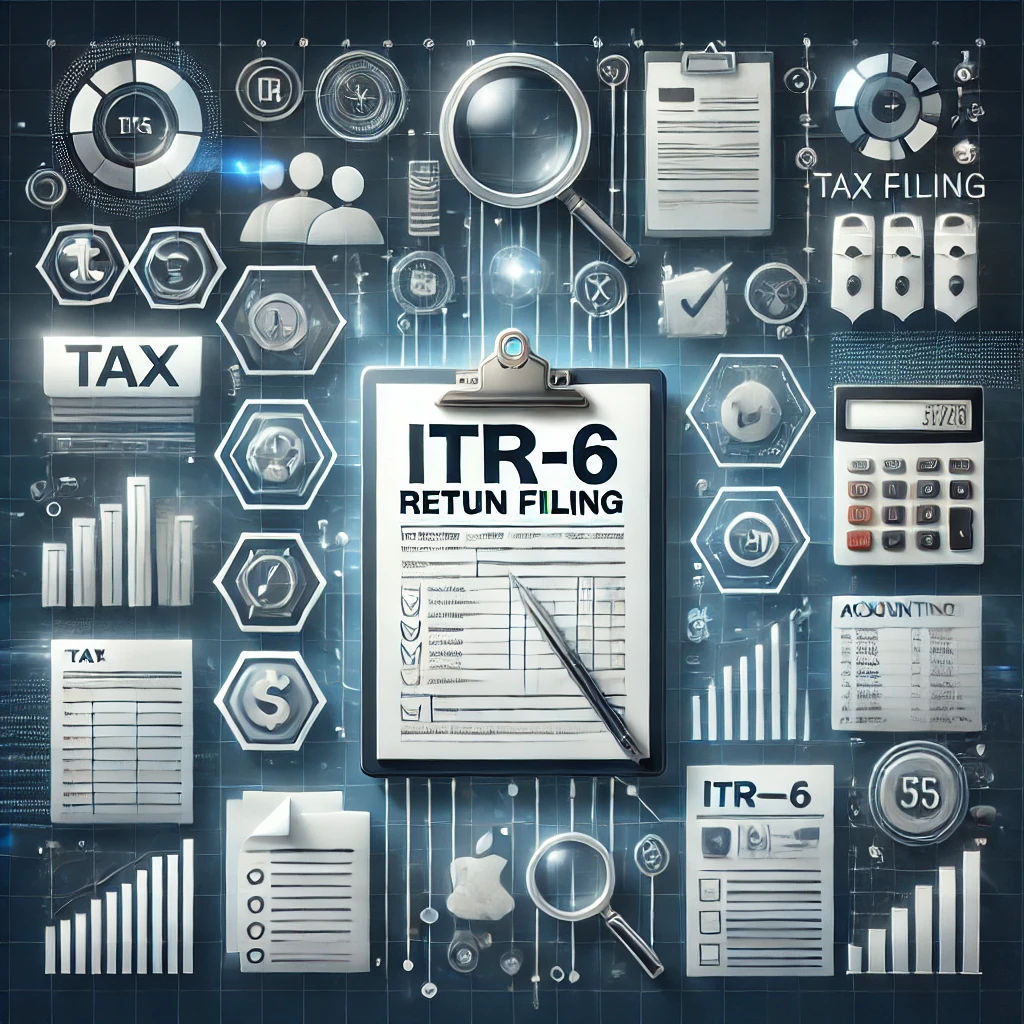Start Business
Start Business
Registration & License
Registration & License
Trademark Filing
Trademark Filing
Goods & Service Tax
Goods & Service Tax
Income Tax
Income Tax
MCA Services
Tender Registration
Tender Registration
Others
ITR-6 Return Filing in India – Tax Filing for Companies Not Claiming Section 11 Exemption
Best & Reasonable Plans
Smart solutions,fair prices - your success starts with the Innovative solutions, competitive pricing – your journey to success begins with the perfect balance for growth!

OVERVIEW
ITR-6 is the income tax return form that must be filed by companies, except those claiming exemption under Section 11 (Income from property held for charitable or religious purposes). This form is specifically designed for businesses registered under the Companies Act, 2013, and is required to be filed electronically. It enables companies to report their total income, claim deductions, and calculate the tax liability for a given financial year. Filing ITR-6 ensures compliance with the Income Tax Act and helps businesses maintain transparency in their financial records.
Key Features Of ITR-6 Return Filing
- • Mandatory Electronic Filing : All companies required to file ITR-6 must do so electronically with a digital signature. This ensures secure and efficient processing of tax returns while reducing paperwork.
- • Applicable for Taxable Companies : ITR-6 applies to all companies except those claiming exemption under Section 11, such as charitable or religious institutions. It includes private limited, public limited, and one-person companies.
- • Includes MAT Calculation : Companies falling under the provisions of Minimum Alternate Tax (MAT) under Section 115JB must compute and report their tax liability accordingly in ITR-6.
What is ITR-6?
ITR-6 is an income tax return (ITR) form specifically designed for companies that do not claim an exemption under Section 11 of the Income Tax Act. Companies that generate income from business operations and are required to pay corporate tax must file their returns using ITR-6. However, organizations whose income is derived solely from property held for charitable or religious purposes (which qualify for tax exemption under Section 11) cannot use this form.
This form applies to private limited companies, public limited companies, and one-person companies (OPCs) that operate for profit and do not fall under the exempted category. The ITR-6 form requires detailed reporting of a company's financial transactions, including income, deductions, tax liabilities, and Minimum Alternate Tax (MAT) calculations under Section 115JB.
Since ITR-6 is a complex form requiring various disclosures, it must be filed electronically with a digital signature by authorized representatives of the company. Companies must ensure accurate reporting of financial data to avoid penalties or scrutiny from tax authorities.
Who Can File ITR-6?
Private Limited Companies
Private Limited Companies are business entities that are privately held and have limited liability, meaning the owners are not personally responsible for business debts beyond their shareholding. These companies are required to file ITR-6 if they generate income from trade, services, manufacturing, or any other taxable business activities. Since they are registered under the Companies Act, compliance with tax regulations is mandatory.
Public Limited Companies
Public Limited Companies are businesses that are listed on stock exchanges and can raise capital from the public by issuing shares. These companies are separate legal entities and must comply with corporate tax laws. If a public limited company earns income from business operations, investments, or any other taxable sources, it must file ITR-6 annually to report its financial status to the Income Tax Department.
A Limited Liability Partnerships (LLPs) Converted into Companies
If an LLP has been converted into a private or public company, it must follow corporate tax regulations and file ITR-6 instead of ITR-5. Once an LLP becomes a company, it enjoys certain legal and financial advantages but also has additional tax compliance requirements. These businesses must report their earnings, expenses, and profits through ITR-6 to meet taxation obligations.
One-Person Companies (OPC)
An OPC is a type of company formed by a single entrepreneur who enjoys limited liability protection while maintaining full control of the business. Despite being a single-owner entity, an OPC is distinct from its owner and must comply with corporate tax filing norms. If the OPC generates taxable income from business activities, it is required to file ITR-6 to ensure regulatory compliance.
Who Cannot File ITR-6?
Companies Claiming Exemption Under Section 11
Any company whose income is derived from property held for charitable or religious purposes and qualifies for tax exemption under Section 11 of the Income Tax Act cannot file ITR-6. These organizations, such as non-profit institutions, religious trusts, and educational institutions, must file ITR-7 instead. Their income is exempt from tax as long as it is used for the specified charitable or religious activities.
Partnership Firms and Limited Liability Partnerships (LLPs)
Unlike private and public companies, Partnership Firms and LLPs follow different tax regulations. LLPs do not have the same corporate tax obligations as companies and must file ITR-5 instead of ITR-6. Since LLPs and partnership firms are taxed at a flat rate on their business income and are not subject to corporate tax rules, they are excluded from ITR-6 eligibility.
Sole Proprietorship Businesses
A sole proprietorship is not a separate legal entity from its owner; instead, the individual's income is considered personal income. Sole proprietors must file ITR-3 or ITR-4, depending on their income type and tax scheme. Unlike private limited companies or LLPs, sole proprietorships do not need to follow corporate tax filing requirements, making them ineligible for ITR-6.
Investment Funds and Trusts
Investment funds such as Alternative Investment Funds (AIFs), Real Estate Investment Trusts (REITs), and Infrastructure Investment Trusts (InvITs) operate under different tax structures. These entities have specific tax obligations and file ITR-5 or ITR-7 instead of ITR-6. Since their earnings are not derived from business operations in the same way as companies, they are exempt from filing under this category.
Tax Deductions and Exemptions in ITR-6
Companies filing ITR-6 can claim various tax deductions and exemptions to minimize their tax liability. The Income Tax Act provides several provisions that allow businesses to deduct eligible expenses, investments, and contributions before computing taxable income. These deductions help companies reduce their tax burden while ensuring compliance with tax regulations.
One of the major exemptions available is under Section 80G, where companies making donations to specified charitable organizations can claim a deduction of up to 100% or 50% of the donated amount, depending on the recipient entity. Similarly, Section 80IA allows companies engaged in infrastructure development, power generation, or telecommunication services to claim deductions on their profits for a specified period.
Companies can also claim depreciation benefits under Section 32, which allows them to deduct the cost of tangible and intangible assets over time. This provision helps businesses reduce their taxable income by factoring in the depreciation of assets like machinery, equipment, and patents. Additionally, Section 35 provides deductions for scientific research and development (R&D) expenditures, encouraging companies to invest in innovation.
For companies engaged in exports, Section 10AA offers tax exemptions for businesses operating in Special Economic Zones (SEZs). This deduction allows eligible companies to claim 100% tax exemption for the first 5 years, followed by 50% for the next 5 years, and an additional 50% deduction for reinvested profits in the subsequent 5 years.
Furthermore, businesses making contributions to employee welfare schemes such as the Provident Fund (PF), Employee State Insurance (ESI), and National Pension System (NPS) can claim deductions under Section 80CCD. These deductions not only benefit employees but also reduce the company's taxable income.
In summary, ITR-6 filers can utilize a range of deductions and exemptions, including charitable donations, infrastructure incentives, depreciation, R&D investments, SEZ benefits, and employee welfare contributions. These provisions enable companies to lower their tax burden while promoting business growth and economic development.
Silent Features
Applicable to Companies
Mandatory E-Filing
Detailed Financial Reporting
Tax Deduction and Exemption Claims
GST Reconciliation Requirement
Audit Report Submission
Advantages of Filing ITR-6
- Legal Compliance & Avoiding Penalties: Filing ITR-6 ensures that the company remains compliant with tax laws. Non-filing or incorrect filing can lead to hefty penalties and legal consequences imposed by the Income Tax Department.
- Claiming Tax Benefits & Deductions : Companies can legally reduce their tax liability by claiming deductions under various sections, such as depreciation benefits, donations under Section 80G, and R&D expenditures under Section 35.
- Enhances Business Credibility: Proper tax filing records improve the company’s credibility, which is essential for securing business loans, attracting investors, and maintaining a strong financial standing.
- Simplifies Financial Documentation: Filing ITR-6 requires companies to maintain proper financial records, including balance sheets and profit and loss statements, which help in better financial planning and decision-making.
- Enables Carry Forward of Losses: Companies can carry forward business losses to future years and set them off against future profits, reducing tax liability in subsequent years.
- Facilitates Easy Loan Approvals & Business Expansion: A clean tax record makes it easier for businesses to secure bank loans, government incentives, and investor funding, which helps in expansion and scaling operations.
Documents Required
PAN Card
Aadhaar Card
Bank Statements
Form 16
Income Proofs
Form 26AS
Step-by-Step Guide For Income Tax Return (ITR) Filing
Here are 5 steps to complete your Income Tax Return (ITR) Filing
Step 1
Gather Required Documents
Step 2
Log in to the Income Tax Portal
Step 3
Select ITR-6 Form and Fill in Details
Step 4
Claim Deductions and Verify Tax Liability
Step 5
Verify and Submit Your ITR
Empowering Your Business to Stay Ahead


Ensuring excellence in every aspect of business operations

Helping businesses to stay ahead of the competition effectively

Providing expert guidance for long-term business growth





